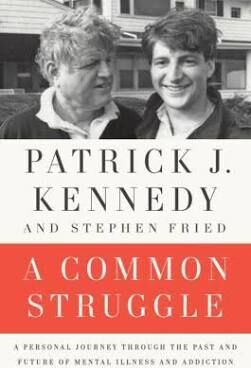Health
Celebrities Who Share Their Mental Health and Addictions
Part II: Their accounts help others' lives.
Posted August 1, 2021 Reviewed by Tyler Woods
Key points
- People struggling with emotions and addiction pay attention when celebrities share similar concerns.
- Several well-known public figures have begun charitable foundations that raise awareness.
- Shifting the conversation from what's wrong with a person to what happened to them helps to eliminate stigma.
In the first installment of this topic, I shared how several well-known celebrities, authors, and athletes have taken a brave stance to share what they are up against with their own mental health and how their choice to go public and share helps society at large eliminate stigma. A myriad of positives come to the forefront when people speak from their vulnerable hearts. Raising awareness remains high on that list.
Elizabeth Vargas, an ABC news anchor featured on 20/20, shared how her worries began as an Army kid in Between Breaths: A Memoir of Panic and Addiction. When her father shipped out to Vietnam, panic for Vargas began at age six, and, sadly, so too did the message to keep it under wraps, telling no one.

In her memoir, Vargas poignantly reveals how a lack of anxiety treatment coupled with the poor coping mechanism of alcohol began her unravelling as she took the world stage as a television news reporter. On a crisp, blue-sky morning in Manhattan, she writes, her swollen eyes, shaky hands and dry mouth experienced on 9/11 couldn’t be attributed to planes careening into skyscrapers. She was hungover after a dinner party in the city. Panicked because her parents were scheduled on a flight from JFK to San Francisco that very morning, she forced herself to hydrate, focus, throw on clothes and find out if they were safe. She raced to the ABC studios to help with coverage and relieve Peter Jennings at the anchor desk.
Predictably, her addiction impacted her marriage and family. During group therapy in one of several rehab stays, she penned a goodbye to chardonnay. She would have preferred to keep her illness private but for a tabloid ready to release the reason for her absence. It was then that Vargas came forward selecting her Good Morning America co-host George Stephanopoulos to interview her as she revealed all.
No one is ever cured of alcoholism, she writes. It’s a choice to be present in every moment, mindful of one’s recovery, and to never take sobriety for granted. Vargas now interviews others to broaden awareness on her podcast Heart of the Matter.1
Craig Melvin, a co-host on NBC’s TODAY shared what it was like to grow up the child of a parent’s addiction in POPS: Learning to Be a Son and a Father. Raised in South Carolina, Melvin discusses how his father’s drinking spiraled out of control, caused an emotional cutoff, and how the two reconciled years later.
In A Common Struggle: A Personal Journey Through the Past and Future of Mental Illness and Addictions, Patrick J. Kennedy (with co-author Stephen Fried) recounts life growing up as a Kennedy, the anxiety that being the son of the only living Kennedy brother brought, and how he numbed the pain of a college back injury with powerful medication.
There’s so much to this former Congressman’s story, but his courage to break with the Kennedy code of silence is most admirable. He discusses, with rare candor, the family tragedies and post-traumatic stress that led family members to alcoholism. He battled bipolar disorder and drug addiction. Hard-won awareness led him to seek treatment. Patrick Kennedy’s years in recovery later allowed him to assist other well-known people through addiction.

Writing about one aunt’s developmental disability (Rosemary Kennedy), he mentioned Eunice Shriver’s commitment to helping that underserved group. His text provides a history of federal legislative and social efforts, like his aunt Eunice starting the Special Olympics.
In one sense, it was like a genogram of mental health lobbying that ultimately helped Patrick Kennedy draft mental health parity, joining with members across the aisle to pass legislation. It became an even greater reality with The Affordable Care Act, which made it illegal to cover mental illness, addiction, and intellectual disabilities any differently than other medical or preexisting conditions.
After leaving Congress in 2010, Kennedy became a mental health advocate. The following year, he partnered with Shari and Garen Staglin to launch One Mind to promote the study of brain illnesses, and in 2013, founded The Kennedy Forum, which is a behavioral health nonprofit.
Putting Money Into Mission
Like Kennedy, 2010 fueled another well-known public figure to begin a nonprofit. Actress Glenn Close founded Bring Change to Mind in order to continue activism that was inspired by family members—a sister and a nephew, diagnosed with bipolar and schizoaffective disorders.
Bring Change to Mind, keenly aware of the stigma that still exists, cultivates relationships with others in the community—businesses, media, and others—to raise awareness. Their website has a unique talking tool and tells how to become involved.2
Close shared her family’s inspiration and stories with Oprah Winfrey and Prince Harry in their Apple TV series titled The Me You Can’t See, which is well worth a month’s subscription to watch all of the installments that are carefully researched.3
The Focus on What Happened, Not What’s Wrong
The Apple TV series makes the very important distinction that stigma persists and that one reason is the unfounded notion that there is something wrong or off with a person who struggles with mental illness or even varieties of anxiety and depressed mood. 'Who among us has not been affected?' they ask.
So telling and profound is this distinction that Winfrey and Bruce D. Perry, M.D., Ph.D. wrote a book of the same title What Happened To You: Conversations on Trauma, Resilience and Healing. Introducing this project, Winfrey recounts being “whupped” if she spilled water, broke something, or could not sit still as a child. These beatings she was subjected to molded her into a people pleaser for much of her adult life.
Bruce Perry was invited to Washington, D.C. by Winfrey who convened experts on child abuse and trauma. Their book details much about how we are all loved, make sense of the world we’re brought into, how we connect the dots, hunger for functional relationships, cope with dysfunctional ones, and heal. The authors drive home the fundamental shift in perspective from being not “what’s wrong with you?” but “what happened to you?” which means quite simply, the book is for all of us.
Copyright @ 2021 by Loriann Oberlin. All Rights Reserved.




